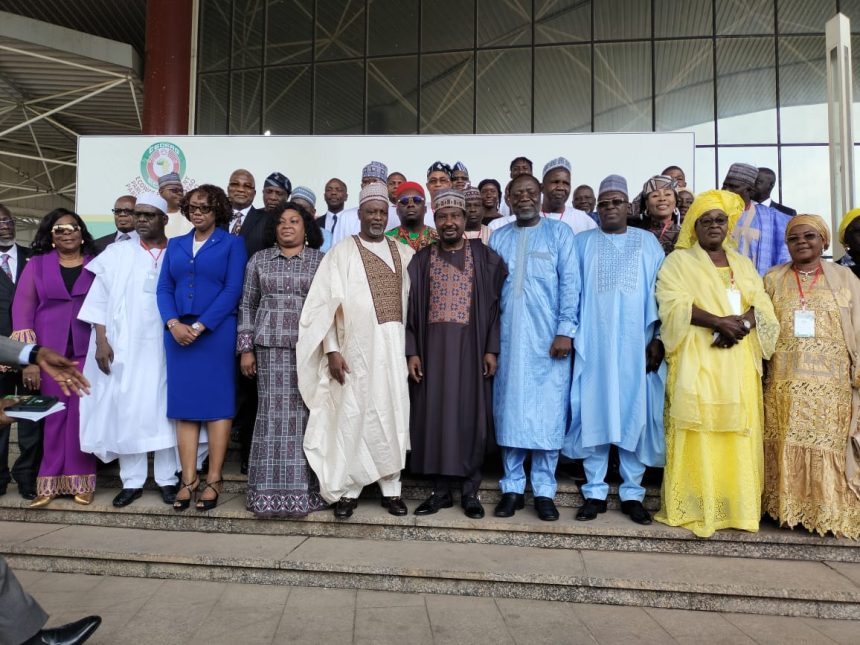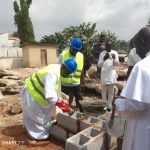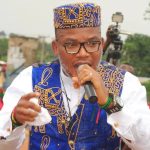By Linus Aleke
Stakeholders at the official opening of the ongoing 2023 Second Ordinary Session of the Community Parliament of the Economic Community of West African States (ECOWAS), escalated discussion on the resurgence of coup d’etat in West Africa, as well as made positive attempt at proffering solutions to the identified menace.
Meanwhile, the several other unacceptable economic, political and security challenges confronting West Africa, have, for decades, defiled countless policy prescriptions of national authorities, collaborative efforts of group of nations, diplomatic strategy of multilateral institutions, foreign aids, as well as loans from Bretton Woods Institutions.
Regrettably, this cancerous ailments plaguing the sub region has for long defiled medications. However, the good news is that the doctors are also not relenting in improving on their integrated medical diagnosis of these identified ailments.
Considered as the worst place to raise a child in the world, because of its negative developmental indices, West Africa is home to no fewer than 450 million inhabitants, out of which more that half are living in abject poverty, and squalor while, an infinitesimal percentage are living in opulence. 2022 data reveals that in Nigeria alone, no fewer than133 million persons are living below poverty line.
Firing the first missile at the debilitating situation in West Africa, as well as the down side of resurgence of coup, the President of ECOWAS Court of Justice, Justice Edward Amoako Asante,
said the current session comes at a time when the region is struggling to cope with a hostile international environment that has not only impacted negatively on their economies but also their capacities to finance community programmes and activities.
In his goodwill message at the event, Justice Asante, expressed hope that through the intervention of the parliament, the community will emerge with a budget that is feasible and realistic without compromising on its effectiveness.
He pointed out that this session also comes against the backdrop of a seemingly benign contemporary development in the region’s democratic progression; the military incursions into politics which is a glaring misnomer in the polity.
These incursions, he said, “not only demonstrate a deficiency in our democratic culture but should challenge us to reflect on the trajectory of our democracy and ascertain whether it is imbued with the efficacy and capacity to deliver good governance that satisfy the socio-economic needs of our people”.
This is as the President of ECOWAS Commission, Dr. Omar Alieu Touray, said that there is fake and false narratives about coups in the sub region.
Justice Asante, further posited that despite current challenges, democracy remains the best form of government that requires the collective effort of the leadership and followership to work.
He recalled that, “During the 2023 international conference of the Court held in Banjul in May this year, the Court sought to draw attention to this worrisome development and the danger to our democratic consolidation by focusing on the theme; ECOWAS’ zero tolerance for unconstitutional change of government. The ECOWAS parliament provides an appropriate forum at the regional level to continue this conversation by revisiting the debate on the particulars of our democracy that was optimistically touted as the panacea for delivering socio-economic growth and development of our people in order to equip them for a competitive international economic environment. This reflection has become urgent because of the recognition that the current situation was partly caused by glaring lapses such as bad governance, the quest for extended tenure in office, failure to deliver the dividends of democracy, unfair elections, the prevalent winner takes all mentality as well as the misapplication and looting of state resources”.
He noted that as a representation of the people, it is expected that those invested with this responsibility must realize that it is an opportunity to serve and not precipitate hegemonic and authoritarian rule by a few for themselves resulting in state capture by a privileged few.
The ECOWAS parliament, he said, will need to provide the leadership for the engagement required through the national parliaments to interrogate our current democratic culture.
This, again, he noted, will require reforms that will precipitate improvements in our democratic systems in order to end this creeping encroachment of the military into our democratic space.
“As the Community institution whose mandate helps to strengthen respect for human rights, accountability and political stability, the Court stands ready to contribute to the consolidation of democracy in the region through fidelity with the discharge of its mandate which contributes to entrenching a culture of respect for the rule of law, accountability and political stability. In this regard, Parliament is encouraged to also take the necessary steps, working with the members of national parliaments, to ensure the seamless enforcement of its decisions by Member State in order to strengthen community law and respect for human rights, transparency and accountability.
“Moreover, it should take the leadership in ensuring that Member States internalize a culture of democracy, rule of law and good governance as well as adopt preventive measures for strict compliance. Additionally, Parliament can also help in other areas such as helping the States to commit to the establishment of ideals and the reinforcement of agreed international protocols for the promotion of the rule of law; strengthen the means for settling electoral disputes at the national level in addition to enacting laws and setting up mechanisms for the independent adjudication of electoral disputes,” he concluded.
However, the President of ECOWAS Commission, Dr. Omar Alieu Touray, applauded, the people of Guinea Bissau and Sierra Leone for the peaceful parliamentary and presidential elections.
He said “I would not want to dwell on the vital role that ECOWAS has played in these elections. Suffice it to say that the good showing of the opposition in these elections show that democracy is alive in the ECOWAS region and that change is possible through peaceful means.
“These changes have also shattered the narrative that political change in Africa is possible only through military coups. Nothing can be further from the truth, especially considering that the coups in Mali, Burkina Faso and Niger removed democratically elected governments that had been in office for less than three years”.
He explained that these military coups are not only based on fake narrative and false justifications; they are also a driver of insecurity in the region.
The Commission’s President recalled that in a statement at the recently concluded Saudi Africa summit, the Nigerian President, Sen. Bola Tinubu issued a stern warning to coupists in the sub region.
President Tinubu according to him, warned: “Do not be hoodwinked by romantic notions of military takeovers; they end up pointing their guns at each other, trying to control the capital cities and leave the border areas to the terrorists. For those who may still not be aware, this poses an existential threat and there must be no weak links in ECOWAS if we are to prevail”.
To drive home the gravity of the insecurity to which military coups contribute, Dr. Touray said that from January 1st to October 22, 2023, no fewer than 1503 incidents of terrorist attacks were recorded in Burkina Faso; 1044, in Mali, 376, and in Niger, 166, since the coup.
These incidents, he added, have resulted in several fatalities; 6811 in Burkina Faso, 2889 in Mali, 768 and in Niger, 557, since the Coup.
The President concluded that in addition to the unbearable toll on human lives, insecurity continues to have dire humanitarian consequences.
In his welcome remarks, the Speaker of ECOWAS Parliament, Rt. Hon. Sidie Mohammed Tunis, said that in the area of democracy and the rule of law, the community must accept the reality
that the existence of strong democratic institutions, respect for human rights, and the rule of law ultimately determines security and development.
He said: “Our democracy can only thrive if we hold each other accountable for our actions. As a result, we must seek out and cherish what unites us as a region
and people”.
Concerning peace and security, he noted that regional solidarity is required in their approach, stressing that “No country in our region can be stable without solidarity”.
According to him, “Our region’s prosperity and safety are inextricably linked to our shared responsibility to look out for one another”
Speaking on the political situation in Mali, Guinea, Burkina Faso, and Niger, Hon. Tunis expressed strongest conviction that ECOWAS needs to do more.
He said: “The position of the ECOWAS Parliament on these countries has always been closely aligned with that of the ECOWAS Authority of Heads of State and Government. Nonetheless, as an independent body the Community Parliament has a moral obligation to go further in providing guidance and support to all other ECOWAS Community Institutions in the pursuit of a new and ambitious mechanism for dealing with regional issues. The reality is that the world has changed a great deal over the past decade. Across the globe,
governments and nations are turning inward, in search of resolutions to their
challenges. For a region like ours, this means that we need to be more self-
reliant. Each Member State must take on more responsibility for the
development and advancement of the ECOWAS region”.
Addressing the regional legislators, in Abuja, the Chairman of the ECOWAS Authority of Heads of States and Government, Sen. Bola Ahmed Tinubu, charged ECOWAS to replicate the European Union success story in the sub region.
The Nigerian leader, prayed that this session, may mark a turning point and set the course for ECOWAS to become the pride of all West Africans, both present and future.
Represented at the occasion by President of the Senate, Sen. Godswill Obot Akpabio, the Nigerian President, said: “While the European Economic Community with similar goals now rest in history, having emerged as a powerful entity. The EU has achieved a single currency for its member states maintained peace, abolished passport control within the schengen region and successfully combined the characteristics of a federation and confederation. African nations, with their unique challenges require even greater cooperation and integration. It is clear that the world is not prioritizing the resolution of Africa’s problems. The atrocities in Sudan go unnoticed while, other regions, receive immediate attention. We must take charge of our own destiny, working together, collaborating and integrating”.
To this end, the Nigerian leader, posed the following question, “Where do we go from here?” He explained that the path ahead lies in the pursuit of integration and development, adding that integration should not be seen as a choice, but as an imperative.
According to him, “It is our duty to leave a lasting legacy for future generations, recognizing that together we can achieve and accomplish more. Let us draw inspiration from the European Union’s example and strive for the advancement of our beloved West Africa. With President Tinubu’s exceptional track record of transformative leadership, we firmly believe he is the right leader for this season. The right leader has emerged at the right time, and we can seize this opportunity and avoid loosing our progress”.
In conclusion, this wonderful ideas canvassed at this multilateral fora, if implement by ECOWAS institutions, and member states, the sub region will not only witness improvement in democratic practice but also gravitate towards unprecedented progress in economic growth and development.











